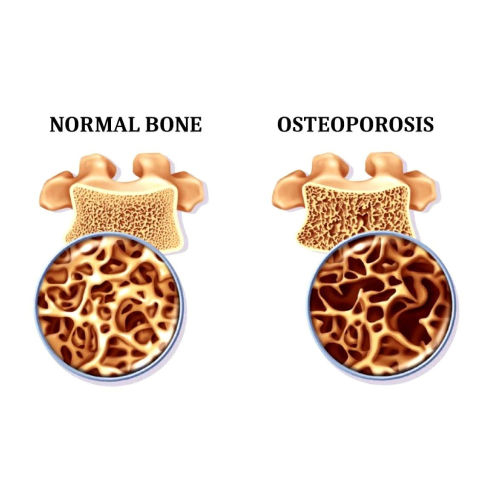


Osteoporosis is a condition characterized by low bone density and structural deterioration of bone tissue, leading to an increased risk of fractures. Osteoporosis does not always cause early signs or symptoms. Often you will only experience symptoms when the condition has advanced to the point where you break bones easily.
Late signs and symptoms of osteoporosis
Signs of osteoporosis become obvious until the condition is quite advanced. Here are some potential signs and symptoms of late-stage osteoporosis.
Spinal involvement
If osteoporosis affects the bones in the spine, you may notice:


Osteoporosis is a condition characterized by low bone density and structural deterioration of bone tissue, leading to an increased risk of fractures. It occurs when the body loses too much bone, produces too little bone, or both. The bones become weak and fragile, making them more prone to fractures, even with minor or routine activities. Osteoporosis often progresses silently without causing noticeable symptoms until a fracture occurs. It’s important to note that osteoporosis can develop in both men and women, but it is more common in postmenopausal women due to the decline in estrogen levels, which plays a protective role in bone health. Other risk factors for osteoporosis include advancing age, family history, low body weight, smoking, excessive alcohol consumption, a sedentary lifestyle, and certain medical conditions or medications.

Common risk factors for osteoporosis include:
People assigned female at birth have a higher chance of developing primary osteoporosis. People assigned male at birth have a lower risk of primary osteoporosis but an increased risk of developing secondary osteoporosis from medication or other underlying causes.
Certain other medical conditions can increase your risk of osteoporosis, including:



Please Note : The HHC holds sole discretion over decisions regarding the treatment plan, session time, package, and package duration. These determinations may differ among individuals with similar complaints and are subject to the patient’s clinical needs. The Management reserves the right to adjust a chosen package based on their clinical judgment, enabling them to modify its scope or duration according to the patient’s clinical requirements.